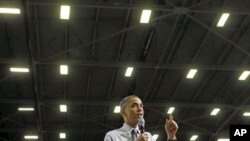A new look at the impact of so-called "green" [environmently-friendly] technology shows it is beginning to pay off for at least some U.S. workers.
Across the United States, businesses and organizations are starting to make a change, shifting to cleaner sources of energy. One such place is the world reknowned Mayo Clinic in the northern state of Minnesota.
"It's becoming affordable to be green," said to Dr. John Black. He is on the Mayo Clinic's Green Committee and said the math is simple.
"For us to be relevant we need to be affordable, and the greening of the Mayo Clinic should provide us with an opportunity save money," said Black.
A report released Wednesday by the Washington-based Brookings Institution says the desire to go with cleaner energy options also is paying off. It says the so-called "clean economy" now employs 2.7 million Americans, pays higher wages and requires little formal education.
Mark Muro, director at Brookings' Metropolitan Policy Program, said, "As a whole it is growing moderately fast, but segments of it are growing extremely fast."
And Muro said the U.S. is well positioned to take take full advantage.
"The growth that we're seeing in some of these renewable and clean tech segments is so compelling, and is projected to grow so fast globally, that it is imperative that the United States begin to foster these industries," said Muro.
But Ken Green, an environmental scientist and resident scholar at the American Enterprise Institute, said the growth of clean-energy jobs may not be enough to boost the struggling economy.
Green said even with more funding and support from the government, clean energy ventures, like wind farms, will face obstacles.
"Many of the jobs involved have been created in China and Asia because at the end of the day, they still have low labor costs," said Green. "They have lower environmental regulations of their own that they have to deal with."
Still, U.S. President Barack Obama has promised to push for more funding, saying America needs to lead on clean energy technology in order to forge what he calls "another American century."
'Green' US Jobs Starting to Pay Off
- By Jeff Seldin




